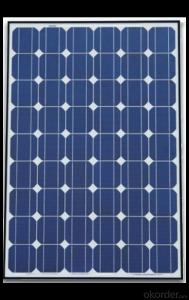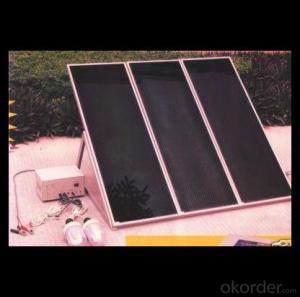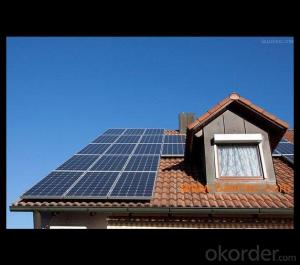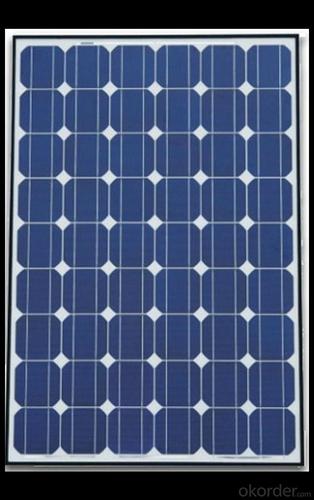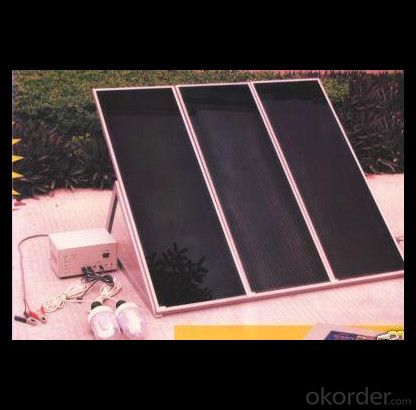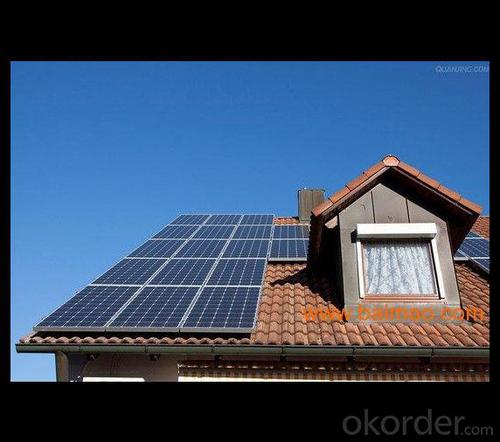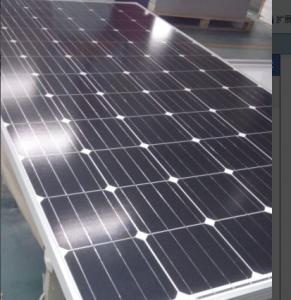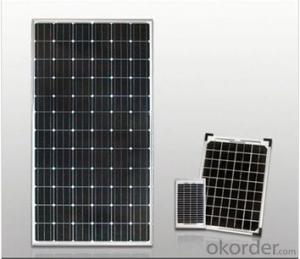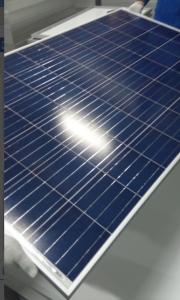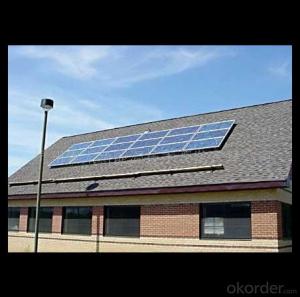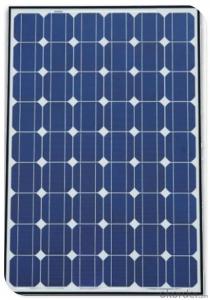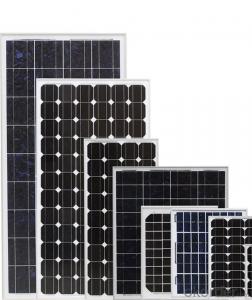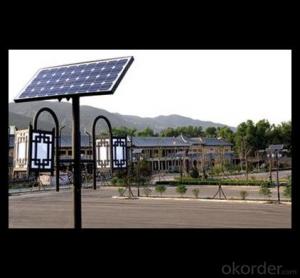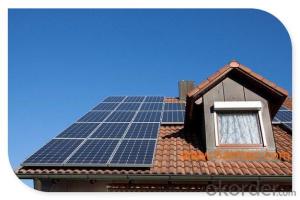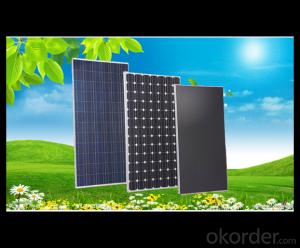265w Emp Proof Solar Panels - Direct Factory Sale Price per Watt
- Loading Port:
- China main port
- Payment Terms:
- TT OR LC
- Min Order Qty:
- 10000 watt
- Supply Capability:
- 100000 watt/month
OKorder Service Pledge
OKorder Financial Service
You Might Also Like
Specification
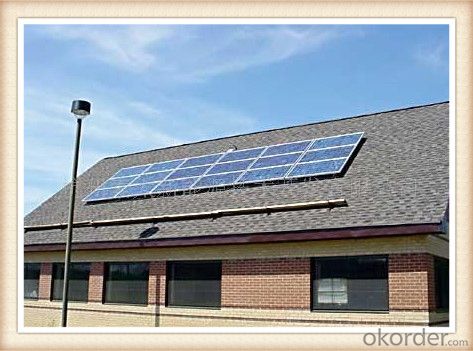
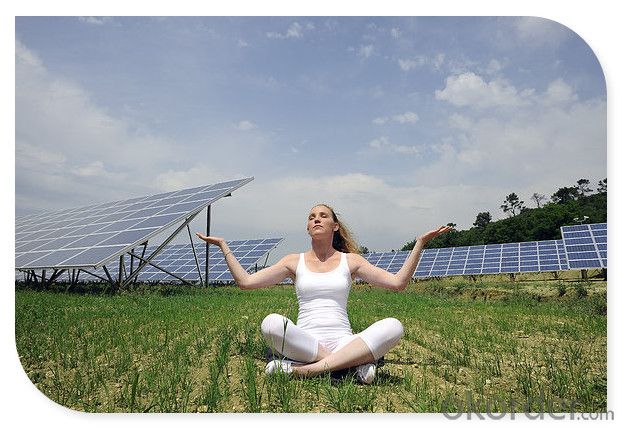
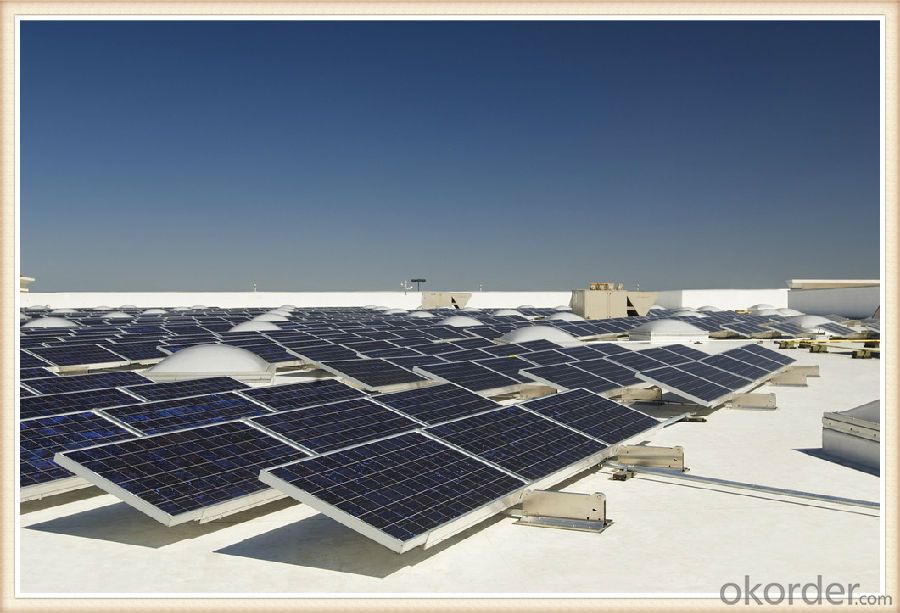
Solar Module Introduction
Solar modules use light energy (photons) from the sun to generate electricity through the photovoltaic effect. The majority of modules use wafer-based crystalline silicon cells or thin-film cells based on cadmium telluride or silicon. The structural (load carrying) member of a module can either be the top layer or the back layer. Cells must also be protected from mechanical damage and moisture. Most solar modules are rigid, but semi-flexible ones are available, based on thin-film cells. These early solar modules were first used in space in 1958.
Electrical connections are made in series to achieve a desired output voltage and/or in parallel to provide a desired current capability. The conducting wires that take the current off the modules may contain silver, copper or other non-magnetic conductive transition metals. The cells must be connected electrically to one another and to the rest of the system. Externally, popular terrestrial usage photovoltaic modules use MC3 (older) or MC4 connectors to facilitate easy weatherproof connections to the rest of the system.
Specification
Model Type | |
Peak Power-Pmax(W) | 5-200W |
Open Circuit Voltage-Voc(V) | 44.2 |
Maximum Power Voltage-Vmp(V) | 36 |
Short Circuit Current-Isc(A) | 5.4 |
Maximum Power Current-Imp(A) | 5 |
Maximum System Voltage | 1000V DC |
Maximum Series Fuse Rating | 10A |
Power Tolerance | -1~+3% |
Temperature Coefficients of Pmax | -0.45%/℃ |
Temperature Coefficients of Voc | -0.348%/℃ |
Temperature Coefficients of Isc | 0.031%/℃ |
Nominal Operating Cell Temperature | 44.5±2℃ |
Standard Testing Condition(STC) | Irradiance:1000W/m²;Temperature:25℃;AM=1.5 |
Qualification Test Parameters | |
Operating Temperature | -40℃~+85℃ |
Storage Temperature | -40℃~+85℃ |
Pressure Bearing | ≥5400Pascal/m² |
Wind Bearing | ≥5400Pascal/m² |
Mechanical Characteristics | |
Cell Size | Mono 125*125mm±0.5 |
No.of Cells | 72pcs(6*12) |
Dimension | 1580*808*40mm |
Weight | 15.5Kg |
Glass | 3.2mm High Transmission,Low Iron |
Frame | Anodized Aluminum Alloy |
Junction Box | IP65Rated |
Internal Diodes | 3 Bypass Diodes |
Cable | 1*4.0mm² Length 900mm |
Images
Packing & Shipping:
We have rich experience on how to pack the panels to make sure the safety on shipment when it arrives at the destination.
The normal size is packed by 25pcs/ carton / pallet. Paper carton for FCL shipping and wood carton for LCL shipping.
Features
1.High reliability with guaranteed -3% to +5% power output tolerance, ensuring return on investment
2.High conversion efficiency based on leading innovative photovoltaic technologies
3.Withstands high wind-pressure and snow load, and extreme temperature variations
4.Attractive appearanceUnique frame design, high mechanical strength, and easy Installation
Warranty:
For c-Si panel: 25years output warranty for no less than 80% of performance, 10 years output warranty for no less than 90% of performance. Free from material and workmanship defects within 5 years.
For a-Si panel: 20 years output warranty for no less than 80% of performance, 10 years output warranty for no less than 90% of performance. Free from material and workmanship defects within 2 years.
•100% product quality protection
•100% on-time shipment protection
•100% payment protection for your covered amount
FAQ:
(1)What price for each watt?
It depends on the quantity, delivery date and payment terms.
(2)What is your size for each module? Can you tell me the Parameter of your module?
We have different series of panels in different output, both c-Si and a-Si. Please take the specification sheet for your reference.
(3)Can you provide the peripheral products of the solar panels, such as the battery, controller, and inverter? If so, can you tell me how do they match each other?
Actually we are only manufacturer of solar panels, but we could try to source them for you in China if you need. We could provide you an optimal system design to instruct you how to install.
(4)Do you have the CE, TUV, UL Certification?
We’ve already passed all the tests, and any certificate is available.
(5)Have you ever sold your products to companies in my country?
Of course, we have customers in all general PV markets, but I think we should expand our market share along with the market growth.
(6)When did your company set up? You are a new company, how can I believe your quality?
We entered into Solar PV industry in 2005, now we have several plants in manufacturing of a-Si and c-Si panels, and our capacity is 220MW per year. Till now we have already passed all the tests by authorized laboratories, e.g. TUV, VDE, UL.
(7)Can you help us install the module if we cooperate with you?
We haven’t entered into installation sector, but we have the plan in near future.
(8) How do you pack your products?
We have rich experience on how to pack the panels to make sure the safety on shipment when it arrives at the destination.
(9) Can you do OEM for us?
Yes, we can.
(10)Can we visit your factory?
Surely, I will arrange the trip basing on your business schedule.
- Q: Can solar panels be installed on a factory or manufacturing plant?
- Yes, solar panels can be installed on a factory or manufacturing plant. In fact, many industrial facilities are opting for solar panel installations to generate clean and renewable energy. The large roof spaces available in factories are particularly suitable for accommodating solar panels, which can help reduce electricity costs and carbon emissions while promoting sustainability.
- Q: I recently got into solar panels, I have little background in electronics but I have done a little electrical work in the past and just want to make a small 36 cell panel to power a 2v battery that would run my a small tv (9 inch) and PS3 for a few hours every night. I have been looking up on how to do it before I get in over my head and I have a few questions.... After you solder all of the cells together then what? Do you hook all of the rows of cells together somehow? Can you connect them straight to a battery? After you hook to the battery do you hook up a power inverter to get the 2 AC plugs that would be needed? Thanks in advance for any help....
- You will have to wire them in such a way that provides the battery with the optimal voltage for it to charge, which on a car 2v battery is around 4v. You said you have some background in electronics so this shouldnt be too difficult. You can connect them straight to the battery yes. Like you said, I believe a power inverter from 2VDC to 0VAC would work just fine. PS3 pulls a lot lot lot of current though so it probably wouldnt last too long. Look up the specs for PS3 and see how many amps it is pulling and purchase your inverter based off of that. I remember trying to run an xbox in my car one time and the inverter I had didnt work because of that. Be careful working with batteries, I had one explode in my face about a month ago.. scariest moment of my life! Good luck!
- Q: okay so im lookin 4 an article which explains how practical, wokable, feasible solar panels are. only positive points please :) give me the link. PLZ HELP!!!!
- Solar Panels are practical because they provide electricity to your home directly avoiding the rates paid to the utility. They are pay themselves off in 5 years or less and supply an income stream in NJ for 5 years!
- Q: I've run out of things to keep me entertained recently and as part of a larger project, I was curious if its possible to 'McGuyver' up a solar panel out of common materials?
- It okorder /
- Q: Can solar panels be installed on a canopy or pergola?
- Yes, solar panels can be installed on a canopy or pergola. In fact, these structures can provide an ideal location for solar panel installation as they are often situated in areas with good sun exposure. By placing solar panels on canopies or pergolas, you can maximize the use of available space while also providing shade and protection from the elements.
- Q: Can solar panels be installed on a government building or facility?
- Yes, solar panels can be installed on a government building or facility. In fact, many governments around the world have been actively promoting the use of solar energy by installing solar panels on their own buildings. This helps them reduce their carbon footprint, save on energy costs, and set an example for others to follow in adopting renewable energy sources.
- Q: Are solar panels fire hazards?
- Solar panels are generally safe and do not pose a significant fire hazard. However, like any electrical system, there is a small risk of fire if there are installation errors, damaged wiring, or improper maintenance. Proper installation and regular inspection can minimize these risks and ensure the safe use of solar panels.
- Q: so...do you think an online store dedicated to selling solar panels/systems will be a good business idea? Since green energy is the 'hottest' growing business area recently with usage growing about 30% per annum and investors putting all their money into solar energy, wind farms, biofuel, etc. I think when you sell solar systems online this will be the most appealing business model to the end customer...especially if you offer free installation on orders of say $000.
- Did okorder , you will see thin film going for 99 cents a watt at times. The crystalline kind of panel that goes for $2.35 a watt is more like $.50 wholesale, and that's for a major distributor, not a (forgive me) small order of $60k, which is less than one container. There is a coming glut of panels, and prices will fall, but that means both wholesale and retail prices. I'm not saying it won't work, but do good research. For example, I think there are many more than 3 or 4 online shops for solar panels. Investigate shipping an warehousing costs. Investigate whether Home Depot really does not offer installation (every time I go in there, I see a guy handing out flyers for installation). And research carefully how much it will cost to provide installation. The typical install requires skilled and licensed workers. It won't be legal in most places unless someone has the necessary certifications. It's not just a matter of screwing the things to the roof. Any roof penetration has to potential to leak if done improperly. And any electrical wiring has the potential for burning the house down. Whatever business you finally pursue, research carefully, or that $60k will flee from you like a jackrabbit.
- Q: Can anyone give me a simple but informative explanation on how solar panels produce electricity/power? Thank you!
- The the very first thing to comprehend is that there's not anything difficult approximately a sun panel. It is not anything greater than a number of sun or PV cells on a board that's outfitted to essentially the most suitable side of your dwelling, mostly at the roof. There are courses available in the market that educate you methods to construct a sun panel and a windmill for simply $a hundred and fifty, and it’s very handy to make. Best of all, you'll be able to keep 70% or extra for your vigour invoice, including as much as enormous quantities of greenbacks each and every yr in financial savings. I reviewed each unfastened courses and paid courses and feature arise with our most sensible to Build your possess sun panels.
- Q: Can solar panels be installed on drones?
- Yes, solar panels can be installed on drones.
Send your message to us
265w Emp Proof Solar Panels - Direct Factory Sale Price per Watt
- Loading Port:
- China main port
- Payment Terms:
- TT OR LC
- Min Order Qty:
- 10000 watt
- Supply Capability:
- 100000 watt/month
OKorder Service Pledge
OKorder Financial Service
Similar products
Hot products
Hot Searches
Related keywords
